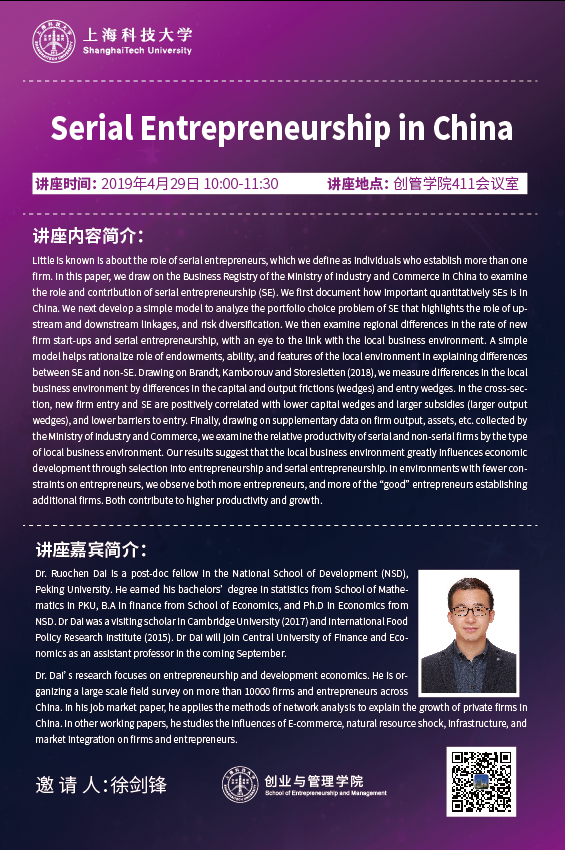Date & Time:April 29, 2019 10:00- 11:30a.m.
Venue:SEM411 Meeting Room
Speaker:Ruochen Dai(National School of Development (NSD), Peking University)
Inviter:Jianfeng Xu
Abstract:
Little is known is about the role of serial entrepreneurs, which we define as individuals who establish more than one firm. In this paper, we draw on the Business Registry of the Ministry of Industry and Commerce in China to examine the role and contribution of serial entrepreneurship (SE). We first document how important quantitatively SEs is in China. We next develop a simple model to analyze the portfolio choice problem of SE that highlights the role of upstream and downstream linkages, and risk diversification. We then examine regional differences in the rate of new firm start-ups and serial entrepreneurship, with an eye to the link with the local business environment. A simple model helps rationalize role of endowments, ability, and features of the local environment in explaining differences between SE and non-SE. Drawing on Brandt, Kamborouv and Storesletten (2018), we measure differences in the local business environment by differences in the capital and output frictions (wedges) and entry wedges. In the cross-section, new firm entry and SE are positively correlated with lower capital wedges and larger subsidies (larger output wedges), and lower barriers to entry. Finally, drawing on supplementary data on firm output, assets, etc. collected by the Ministry of Industry and Commerce, we examine the relative productivity of serial and non-serial firms by the type of local business environment. Our results suggest that the local business environment greatly influences economic development through selection into entrepreneurship and serial entrepreneurship. In environments with fewer constraints on entrepreneurs, we observe both more entrepreneurs, and more of the “good” entrepreneurs establishing additional firms. Both contribute to higher productivity and growth.
Speaker Biography:
Ruochen Dai is a post-doc fellow in the National School of Development (NSD), Peking University. He earned his bachelor's degree in statistics from School of Mathematics in PKU, B.A in finance from School of Economics, and Ph.D in Economics from NSD. Dr Dai was a visiting scholar in Cambridge University (2017) and International Food Policy Research Institute (2015). Dr. Dai will join Central University of Finance and Economics as an assistant professor in the coming September.
Dr. Dai’s research focuses on entrepreneurship and development economics. He is organizing a large scale field survey on more than 10000 firms and entrepreneurs across China. In his job market paper, he applies the methods of network analysis to explain the growth of private firms in China. In other working papers, he studies the influences of E-commerce, natural resource shock, infrastructure, and market integration on firms and entrepreneurs. In the coming seminar, he will present a working paper co-authored with scholars in University of Toronto and University of Oslo: “Serial Entrepreneurship in China”.





